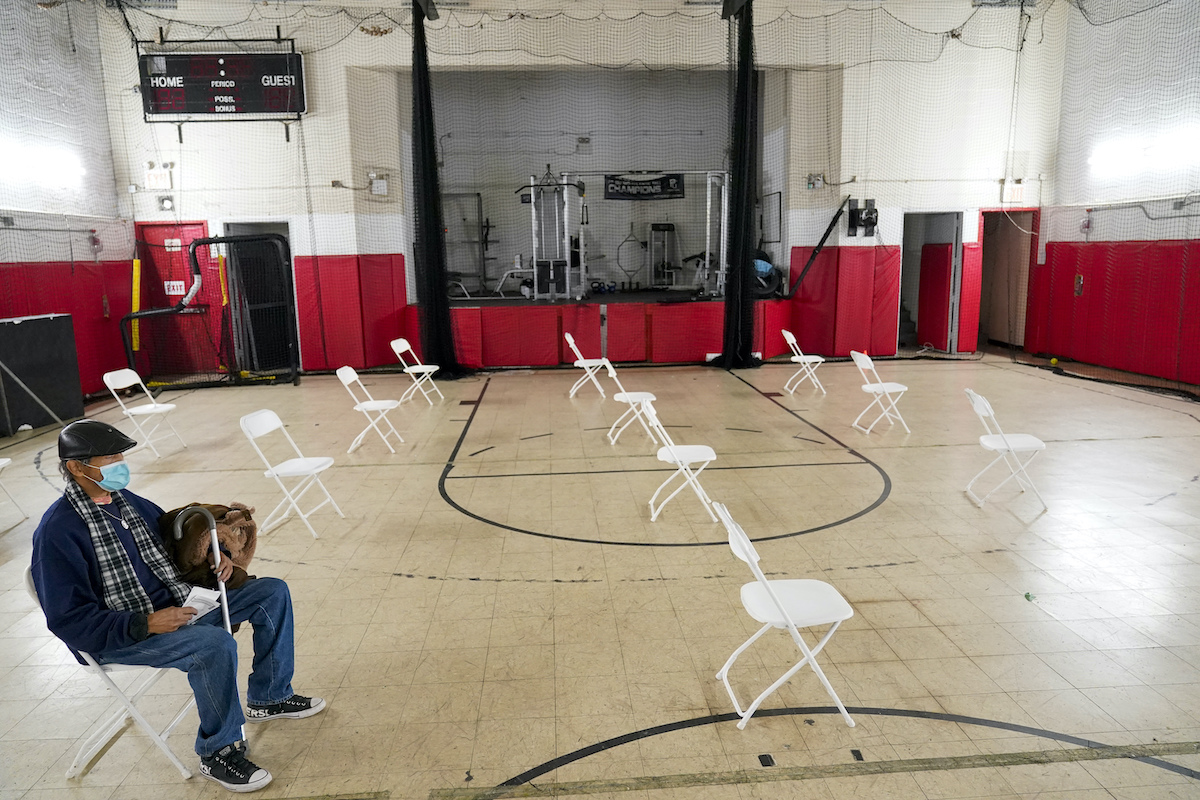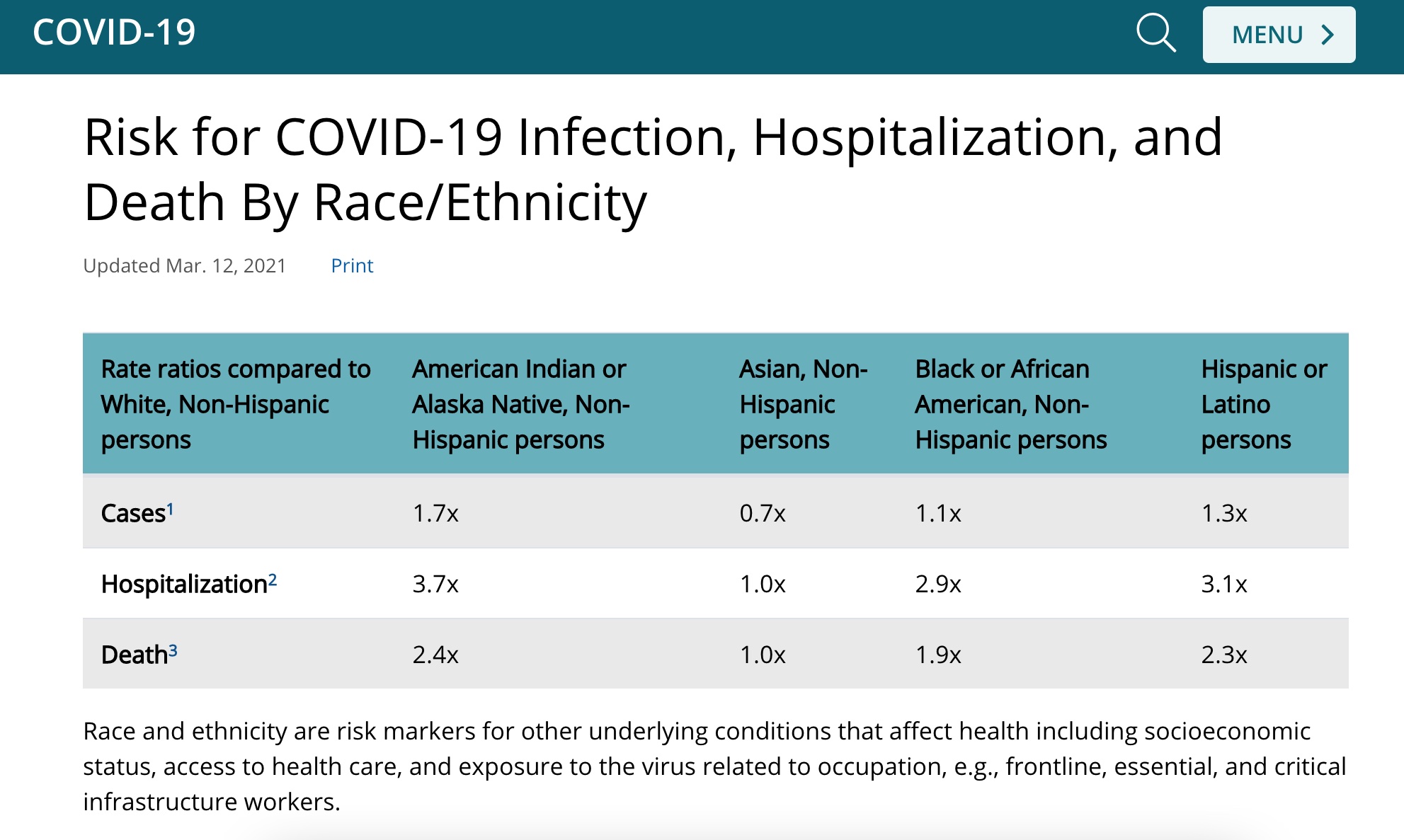

Jesús Rodríguez sits in the recovery area after receiving the first dose of the coronavirus vaccine at a COVID-19 vaccination site at the Corsi Houses, Friday, January 15, 2021, in the East Harlem neighborhood of New York. (AP Photo/Mary Altaffer)
Of the people I know personally who have died from COVID-19, all of them were considered members of underrepresented communities in these United States. Split on political, socio-economic and racial lines, COVID is hitting some groups in our country harder than others. A sad reality, indeed.
As data becomes more available, we are discovering that certain races and ethnicities seem to be favored victims of COVID-19. Go into any ER, COVID wing, or hospital morgue and you will see that Black and Latino populations are significantly overrepresented among the dead.
As per the CDC data most recently published in March, individuals of Hispanic descent are 1.3 times more likely to develop a Covid infection, 3.1 times more likely to be hospitalized and 2.3 times more likely to die than white, Non-Hispanic individuals.


Among the Black population, they are 1.1 times more likely to get infected, 2.9 times more likely to be hospitalized and 1.9 times more likely to die. Among the Native American population, they are 1.7 times more likely to be infected, 3.7 times more likely to be hospitalized and 2.4 times more likely to die.
So are Latinos and Blacks more vulnerable to COVID 19 infection and complications? The data seems to say so. But why is it a specific racial or ethnic vulnerability?
The culprit is something more insidious. It is the reality that certain communities are at risk simply due to their socioeconomic status. Essentially, groups of people who do not have the luxury of social distancing because they need to work and cohabitate in close quarters in order to earn their living. The most essential of our workers, those who handle and process our food and who are the backbone of our economy, are at the greatest risk. Why? Because they are also are most marginalized citizens.
It has been known for millennia that the most vulnerable individuals during epidemics and pandemics are the poor. The groups of people with social circumstances that lead to unhealthy lifestyle habits and limited or no access to health services always bear the brunt of health-related emergencies. Many Latino communities fall under this reality as do many Black and Asian populations.
Socially, our Latino and Black populations are more vulnerable to a multitude of health issues, including overcrowded living situations, limited access to health services, poor quality food, high incidence of diabetes and hypertension, excessive drinking and smoking, working long hours, limited sleep, high stress, and other circumstances resulting from psychosocial neglect.
Adding to this is the uncertainty of a neglectful political environment that tends to marginalize and criminalize undocumented workers and low-income earners. The likelihood of these people obtaining preventive or early illness medical services is severely limited. This puts these populations at a much higher risk of contracting a disease such as COVID-19.
Undocumented workers, in particular, suffer from many of the social ills of poverty. Since many of them are here to support their families in other countries with significantly worse living conditions than here, they often become victims of unscrupulous business owners. They become easy prey to those who wish to save money on production costs and labor.
These hard-working individuals are often seen as “perfect slaves.” They work hard for significantly less money and are easily replaceable. They are forced to also live and work in a nether world of uncertainty, stuck between an employer’s desires and the threat of the authorities coming to take them away. When no longer needed, they are easily discarded, victims of this form of work exploitation. They receive no severance, no services, no support. Thus, they are particularly vulnerable.
However, during this pandemic, they are, in reality, the most essential of all workers. Why has toilet paper gone from supermarket shelves and your food products haven’t? Because these workers are still in the fields, processing plants, and factories—working while many of us are sheltering at home. Once again exploited for their expendability, they work to keep our economy moving and to keep us fed.
A sad reality is that “imported” workers have served as de-facto indentured servants and slaves in this country since its founding. It is the cheap labor that can be found in other less developed countries masked in order to make us look better while still being competitive in the marketplace. Essentially, traditional colonial slavery has been replaced by illegal immigration and undocumented workers.
This leads to an institutionalized form of exploitation that oppresses many while providing inexpensive goods for the rest of us. The abuse of these hard-working individuals who are simply trying to support and protect their families is tragic.
It is a worldwide phenomenon. It is a more accepted method of slavery, if you will. We use them, abuse them, and discard them when no longer needed.
The pandemic has made evident that the health of ALL individuals translates into better health for all of us. Therefore, neglecting this population is done at our own risk. It is not just the work environment that is a hazard. Overcrowded living conditions and lack of regular health services make these people vulnerable to sicknesses and infections such as COVID 19. Yes, one must wash our hands, not touch one’s face, wear a mask, maintain a healthy distance, stay home and wait. But how is that possible with multiple people in a one-bedroom apartment, with one bathroom, and limited private space?
About 20% of Latinos are not in the U.S. legally. Due to this, they cannot receive public assistance or unemployment benefits. Some states have allocated resources to help this population during the pandemic. However, states like California are the exception and not the rule.
In the U.S., we eventually do the right thing. However, it is often done for the wrong reasons. The U.S. economy cannot function without these “perfect slaves.” Many Latinos, mainly poor and undocumented, will die during the pandemic in support of this country, our populace and the economy.
Their sacrifices should not be forgotten. However, they more than likely will be as the nation conquers the virus and accompanying disease. When things return to “normal,” we will once again turn a blind eye to these essential workers. They will go back to the farms and meatpacking plants, will continue to be used, abused and discarded. Few will ask, “Why did this happen to our poor people?” and we will return to our life of comfort and plenty.
The answer for our society will not come from a vaccine or medication. It is not about ventilators or PPE. The answer will come from a better understanding of poverty as a driver of social ills that, in the end, affect us all. If the most vulnerable in our society, on whom we very much rely, continue to be the worst hit, then we are all vulnerable.
In the long run, a decrease in poverty and accompanying implementation of preventive health services, nutrition counseling and the elimination of virtual slavery via a functional wage as well as decreasing homelessness will be the best antidote against any pandemic—present or future.
We can do the right thing, even if we do it for selfish reasons. The virus is a circumstance that forces us to see our vulnerabilities (excessive poverty, overcrowding, lack of health services and health habits) that will kill many many in the most vulnerable communities. Allowing these populations to suffer greatly increases the risk to us all.
COVID-19 is contractable by all human beings regardless of race.
The current and future pandemics, pose an existential threat to all of us. It would behoove us to support those who keep our lives and economy going at great personal risk to themselves. We are in this together, as a species, not just as disparate groups with differing skin tones.
I challenge all to stop asking, “Why?” and to start asking how each of us can help. When COVID-19 leaves us, let us not lose the lesson in humanity, cooperation and shared risk. Let us do all that we can so that a second, third or even tenth pandemic may pass with less disruption and death. Let this experience bring us together as a nation, a people and as a species.
***
Dr. Lauro Amezcua-Patino is the clinical voice of The Only You (Solo Tú), a podcast dedicated to simplifying the complex issues of the mind and mental illness. Originally from Mexico, Dr. Amezcua-Patino has been practicing in the metropolitan Phoenix area for over 30 years. Twitter: @SuSaludMental.



[…] This content was originally published here. […]